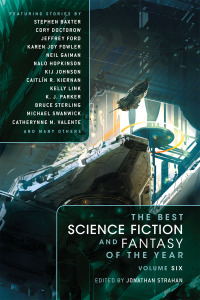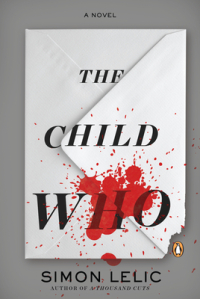The Best Science Fiction and Fantasy of the Year vol. 6 by Jonathan Strahan, ed.
 Friday, March 9, 2012 at 10:46PM
Friday, March 9, 2012 at 10:46PM 
Published by Night Shade Books on March 6, 2012
Despite their occasional overlap and inevitable shelving together in libraries and bookstores, science fiction and fantasy are typically as different as physics and magic. One problem with including both fantasy and science fiction in a "best of" anthology is that fans of one but not the other must endure (or skip) a number of stories that they aren't likely to enjoy. Another problem is that the anthologist, in order to please everyone, must assemble a large volume that probably won't entirely please anyone. As dictated by my own preferences, I tended to favor the science fiction over the fantasy in this collection, although Jonathan Strahan selected stories in both genres that I enjoyed.
Two memorable stories that start the collection -- one clearly fantasy and the other sort of a hybrid -- revolve around bees. Eugenia Lily Yu's allegorical "The Cartographer Wasps and the Anarchist Bees" imagines map-making and empire-building wasps negotiating with delegates from a hive of bees to resolve a territorial dispute. In "The Case of Death and Honey," Neil Gaiman sends Sherlock Holmes to China, where black honeybees figure in his investigation of the greatest crime of all: the inevitability of death.
Other stories also stand out. Jeffery Ford writes of a weary priest at the end of the world, a talking fish, and the lives changed by the foot of a dead saint (or maybe she was a sinner, and maybe it isn't her foot at all) in "Relic." Paul McAuley tells an unconventional story about a common sf topic in "The Choice" as two young men decide whether and how to use an alien artifact they come to possess. "Malak" refers a robotic military craft with a twist; Peter Watts has imbued his robot with a type of conscience, the ability to assess collateral damage and (if not overridden) to take it into account when making tactical decisions. I would never have thought I'd admire a story about a troll, but Peter S. Beagle's "Underbridge," about a washed-up professor who befriends Seattle's Fremont Troll, made me a believer.
File these under interesting but odd: In Geoff Ryman's "What We Found", a young man tells of growing up in Nigeria before discovering the scientific principle that truth wears out over time. I can't begin to understand "The Server and the Dragon," Hannu Rajaniemi's story about a server (one of many seeding the universe) that has sex with a dragon, but I admire the way it is written. In "The Dala Horse," Michael Swanwick writes of a little Swedish girl with a toy horse who turns out to be something quite different than she first appears ... or is it is the horse that is different?
Funny is always difficult to do well. Cory Doctorow kept me laughing (and thinking about whether "smart" technology might be too smart) with "The Brave Little Toaster," his tale of a squeeze pouch energy drink that turns out to be a rhyming prankster. Dylan Horrocks contributes the very funny (and serious and bizarre and strangely touching) "Steam Girl," about a girl who tells (and illustrates) stories about a dimension-jumping steampunk heroine on Mars ... or perhaps she's telling (and drawing) true stories about herself. How does a colonist establish diplomatic relations with body-snatchers on an alien planet, particularly when the colonist is terrified of them and specializes in waste disposal rather than diplomacy? That's the question posed in An Owomoyela's amusing story, "All That Touches the Air." Karen J. Fowler's "Younger Women" is a cute story about a woman's reaction to the discovery that her daughter is dating a vampire.
Many of the stories are good but not exceptional. Ian McDonald contributes a fairly ordinary story of Martian adventure called "Digging." Ellen Krages writes about the first baby born on Mars in "Goodnight Moons." In the world Kij Johnson constructs in "The Man Who Bridged the Mist," an architect faces the daunting task of building a life-altering bridge over a dangerous divide between the two sides of the Empire, a mysterious flowage of mist in which monsters dwell. Robert Reed writes of a digital man, seemingly immortal, who travels the stars and encounters new life, all the while pining for the long-dead woman who created him, the "Woman in Room." Grown in Tower 7 with a variety of other freaks, an accelerated woman with unusual abilities discovers a secret and yearns for freedom in Nnedi Okorafor's "The Book of Phoenix." What starts as a first contact story turns into something quite different as the approaching aliens bypass Earth so they can focus their attention on the vastly more intelligent Venusians in "The Invasion of Venus" by Stephen Baxter. In "Old Habits," Nalo Hopkinson writes about ghosts who live in a mall, haunted by the life that surrounds them. Echoing Amadeus, "A Small Price for Birdsong" by K.J. Parker explores the relationship between murder, freedom, and musical genius. After America self-destructs, the mother and daughter in "After the Apocalypse" start walking toward a rumored camp in Canada -- Maureen McHugh's answer to The Road (featuring a parent who is less noble but considerably more complex than the "man carry fire" character in Cormac McCarthy's novel).
Strahan chose some stories that, while not necessarily bad, just didn't appeal to me. They were written by Caitlín R. Kiernan, Catherynne M. Valente, Ken Liu, Kelly Link, M. Rickert, Robert Shearman, Bruce Sterling, Margo Lanagan, and Libba Bray.
On the whole, I think there are better annual collections than this one (if only because they are more limited in scope), but the book still offers a chance to read some very good stories.
RECOMMENDED


